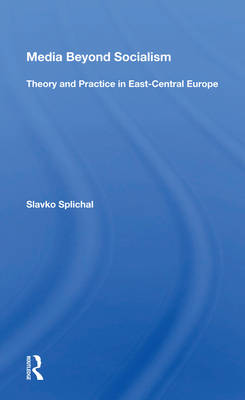
- Afhalen na 1 uur in een winkel met voorraad
- Gratis thuislevering in België vanaf € 30
- Ruim aanbod met 7 miljoen producten
- Afhalen na 1 uur in een winkel met voorraad
- Gratis thuislevering in België vanaf € 30
- Ruim aanbod met 7 miljoen producten
Zoeken
Media Beyond Socialism
Theory and Practice in East-Central Europe
Slavko Splichal
Hardcover | Engels
€ 195,95
+ 391 punten
Uitvoering
Omschrijving
Media Beyond Socialism treats the changing relationships among media, state, economy, and civil society in the current period of transition in East Europe from socialism to the establishment of Western-type democracies. Analyzing the relevance of mass communication and particularly of the media in the democratization process, the book addresses such issues as the problems of civil society, the principles of power and profit maximization in the communication sphere, the role the media have played in the "velvet revolution," and concerns surrounding East Europe's new "information age." First offering a fundamental theoretical discussion, Splichal goes on to share empirical data documenting the changes in the East-Central European print and broadcast media in terms of ownership, political control, the role of the media, and journalism practices as well as paradoxes stemming from the economic and political restructuring of the former socialist societies. He closely examines the claim that the media have taken a radical departure from their previous activities in East-Central Europe and challenges the notion that authoritarian control of the media has been buried in the transition to democracy. Indeed, Splichal asserts that the media are in the process of mimicking the Western design and are often placed under the control of paternalism, commercialism, and nationalism.
Specificaties
Betrokkenen
- Auteur(s):
- Uitgeverij:
Inhoud
- Aantal bladzijden:
- 196
- Taal:
- Engels
Eigenschappen
- Productcode (EAN):
- 9780367007775
- Verschijningsdatum:
- 18/09/2018
- Uitvoering:
- Hardcover
- Formaat:
- Genaaid
- Afmetingen:
- 140 mm x 229 mm
- Gewicht:
- 521 g

Alleen bij Standaard Boekhandel
+ 391 punten op je klantenkaart van Standaard Boekhandel
Beoordelingen
We publiceren alleen reviews die voldoen aan de voorwaarden voor reviews. Bekijk onze voorwaarden voor reviews.











